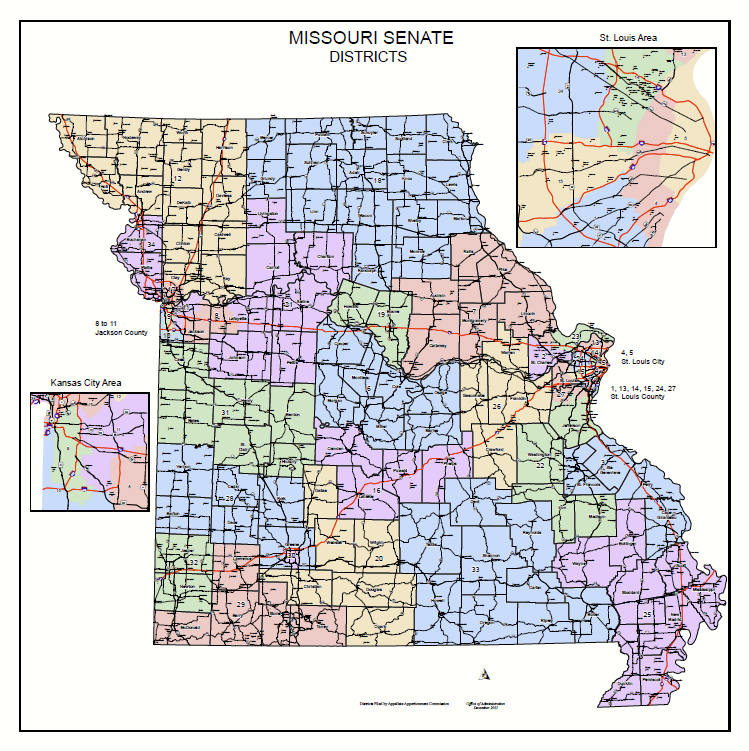JEFFERSON CITY, Mo. — The campaign that successfully advocated for sweeping changes to the Missouri General Assembly shows no sign of backing down as legislators look to alter the voter-approved constitutional amendment.
In the final days of bill filing for the 2019 regular session, five Republican lawmakers filed resolutions that would make significant changes to the new standard for redistricting approved on the November ballot.
Amendment 1, which was backed by the Clean Missouri campaign, limited lobbyists gifts, lowered campaign contribution limits, extended the transition time from public service to lobbying, and open lawmakers’ records to the public. One of the more notable, and contentious, provisions were changes to the redistricting requirements for the General Assembly.
It is those changes to how state legislative districts are drawn that lawmakers are looking to alter.
“Missourians just passed a new law to stop gerrymandering in November, by an almost two to one margin,” said Bob Johnson, a Lee’s Summit Republican who previously served in the General Assembly. “Their mandate from more than 1.4 million Missourians was clear: fair and competitive maps.”
Now in the Missouri Constitution is the requirement that when the newly-created nonpartisan state demographer draws districts, fairness and competitiveness be the leading factor to boundaries.
Five measures — Sen. Bill Eigel’s SJR 23, Sen. Dave Schatz’s SJR 29, Rep. Phil Christofanelli’s HJR 46, Rep. Curtis Trent’s HJR 47, and Rep. Jeff Pogue’s SJR 57 — filed in the General Assembly would change that. All five resolutions would go to a statewide vote if they get approval from the General Assembly.
The different proposals filed would change the priority order for drawing districts. While the proposals have various factors at the top of their lists, they all move fairness and competitiveness to the bottom or repeal the provisions altogether.
The Eigel and Schatz proposals put population as the priority with contiguous territory following. Partisan fairness and competitiveness are listed as the last criteria for both. Trent’s resolution has equal population, contiguity of territory, and compactness as the top three priorities, respectively. All other criteria under the Missouri Constitution is relegated to sixth out of six in priority.
“Currently Missouri’s districts are drawn to be compact and contiguous — they prioritize keeping communities together without regard for party labels. Placing ‘fairness and competitiveness’ at the top of the map criteria absolutely means communities will be split up and their collective voices diluted in the legislature,” said Schatz.
“I think it is important to preserve community representation in the districts and to preserve compactness of a district,” said Trent. “There are issues that transcend politics, issues that effect an individual community and that community should be able to speak with one voice to state government through their representatives.”
Pogue’s resolution would completely repeal the entirety of the changes approved by voters in November. Christofanelli’s proposal would repeal the redistricting processes involving the nonpartisan state demographer.
Supporters of Amendment 1 are alleging that the proposals would “undermine” the voters’ will and “gut” the mandate.
“These new proposals are designed by incumbent politicians to eliminate the rules voters just added to the state constitution to require fair legislative district maps,” said Nancy Miller, co-president of the League of Women Voters of Metro St. Louis.
The campaign that backed Amendment 1 is prepared to defend the standards approved by an overwhelming margin of voters.
Sean Nicholson, with Clean Missouri, said that campaign will fight against any attempt to overturn the voters’ will and that the voters themselves are prepared to defend their decision.
In February, Eddie Greim, a Kansas City lawyer with expertise in redistricting, told the Missouri Times that the standards passed in November make the Show-Me State is a bit of a “laboratory” experiment.
The model, which is currently in the Missouri Constitution, to determine what constitutes fair and competitive districts has never actually been used before, according to Greim. He noted that any nonpartisan fairness model essential designates that a political party has a right to a specific number of legislative seat.
Greim also said that by making political fairness the top priority over compactness or contiguity it opens up the possibility of odd-looking districts that smash together vastly different communities.

Alisha Shurr was a reporter for The Missouri Times and The Missouri Times Magazine. She joined The Missouri Times in January 2018 after working as a copy editor for her hometown newspaper in Southern Oregon. Alisha is a graduate of Kansas State University.















